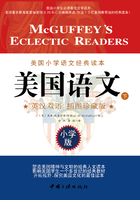
第3章 A Boy on a Farm 农场里的男孩
Charles Dudley Warner ( b. 1829 ) was born at Plainfield, Mass. In 1851 he graduated at Hamilton College, and in 1856 was admitted to the bar at Philadelphia, but moved to Chicago to practice his profession. There he remained until 1860, when he became connected with the press at Hartford, Conn., and has ever since devoted himself to literature. "My Summer in a Garden," "Saunterings," and "Backlog Studies"are his best known works. The following extract is from "Being a Boy."
Say what you will about the general usefulness of boys, it is my impression that a farm without a boy would very soon come to grief. What the boy does is the life of the farm. He is the factotum, always in demand, always expected to do the thousand indispensable things that nobody else will do. Upon him fall all the odds and ends, the most difficult things.
After everybody else is through, he has to finish up. His work is like a woman's,—perpetually waiting on others. Everybody knows how much easier it is to eat a good dinner than it is to wash the dishes afterwards. Consider what a boy on a farm is required to do,—things that must be done, or life would actually stop.
It is understood, in the first place, that he is to do all the errands, to go to the store, to the post office, and to carry all sorts of messages. If he had as many legs as a centiped, they would tire before night. His two short limbs seem to him entirely inadequate to the task. He would like to have as many legs as a wheel has spokes, and rotate about in the same way.
This he sometimes tries to do; and the people who have seen him "turning cart wheels" along the side of the road, have supposed that he was amusing himself and idling his time; he was only trying to invent a new mode of locomotion, so that he could economize his legs, and do his errands with greater dispatch.
He practices standing on his head, in order to accustom himself to any position. Leapfrog is one of his methods of getting over the ground quickly. He would willingly go an errand any distance if he could leapfrog it with a few other boys.
He has a natural genius for combining pleasure with business. This is the reason why, when he is sent to the spring for a pitcher of water, he is absent so long;for he stops to poke the frog that sits on the stone, or, if there is a penstock, to put his hand over the spout, and squirt the water a little while.
He is the one who spreads the grass when the men have cut it; he mows it away in the barn; he rides the horse, to cultivate the corn, up and down the hot, weary rows; he picks up the potatoes when they are dug; he drives the cows night and morning; he brings wood and water, and splits kindling; he gets up the horse, and puts out the horse; whether he is in the house or out of it, there is always something for him to do.
Just before the school in winter he shovels paths; in summer he turns the grindstone. He knows where there are lots of wintergreens and sweet flags, but instead of going for them, he is to stay indoors and pare apples, and stone raisins, and pound something in a mortar. And yet, with his mind full of schemes of what he would like to do, and his hands full of occupations, he is an idle boy, who has nothing to busy himself with but school and chores!
He would gladly do all the work if somebody else would do the chores, he thinks; and yet I doubt if any boy ever amounted to anything in the world, or was of much use as a man, who did not enjoy the advantages of a liberal education in the way of chores.
查尔斯·达德利·华纳,1829年生于马萨诸塞州的普雷恩非尔德。1851年毕业于汉密尔顿大学,1856年,费城的法庭邀请他去做律师,但是他却毅然选择了到芝加哥发展他的事业。直到1860年,他与康涅狄格州哈特福德出版社有了联系,从此投身文学。《花园中的夏天》《闲庭信步》和《储备研究》是他最著名的作品。本文选自《作为一个男孩》。
来说说你觉得那些男孩们一般都有些什么作用吧。我觉得,农场里要是没有那些男孩们,便将荒芜。那么男孩们在农场里究竟都做些什么来让农场不荒芜呢?他是勤杂工,事无大小都需要他来处理,大家需要他做很多无人能替代的事。他也几乎承担了所有杂七杂八的事儿,还有那些最难做的事儿。
所有的人全都收工的时候,他还在处理最后的工作。他的工作就像妇女一样,永远等待着收拾别人的餐具。众所周知,美餐一顿固然要容易过饭后刷碗。想象一下,这就好比男孩们在农场上要干的活儿,但是这些事总得有人干,要不生活就没办法继续。
我们知道,首先,他们得跑腿去商店、邮局等地传递所有的消息。即使他们的腿儿和蜈蚣一样多,跑完这些差事也需要费好大一番力气,还没到睡觉的时候,他们就都已经累坏了。要完成这些差事,靠那两条细腿还真是不够用。他们的腿儿最好像车轮的木条一样多,而且转得一样快。
而他们也的确在大部分时候都努力做到这样。大家常常看到他们在道边“旋转车轮”,还以为他们是在玩耍嬉戏。其实,他们是在研究新的跑步方式,以便可以更有效地利用他们的双腿,帮人们去办更多的事情。
他们学习倒立,为了使自己习惯于各种姿势。他门练习背跃,以更快地跳离地面。如果你让他们一起边练习背跃边去跑腿,我相信他们绝对乐意这样做。
他们天生就有这种能耐,可以劳逸结合。所以如果你让他去打一桶泉水,他们也学好久都不会回来。因为他们会在路上逗石头上的青蛙玩,假若有水阀的话,他们便会双手压在水管口上玩一会儿水。
他们收集别人修剪下来的杂草和树叶,再把这些搬到畜舍里,他们沿着炽热单调的田垄骑马种玉米,他们拾起挖出来的土豆,他们每天早晚都要去放牛,还要捡柴、打水、劈柴,他们也负责刷洗马匹,哄哪些马儿们睡觉;不论是室内还是室外,总有做不完的事等着他们做。
开学前的冬天,他们要负责铲平道路;到了夏天,他们便要去拉磨。他们了解冬青草和菖蒲都生长在哪里,但是他没有去采摘它们,而是待在家里削苹果,还有晒葡萄干和研磨果汁。虽然他的头脑里满是这样那样的计划,但是他的手上全是这样那样的活,人们还是认为他们都是游手好闲的人,除了上学和做些散工,什么也不会。
他们何尝不是这样想:如果别人愿意帮他们做这些散工,他便愿意承担其它所有的工作。但是,我觉得如果男孩不能在这些散工中接受到普通的教育,到头来他们可能真的什么都不会,永远无法成为一个能干的男人。